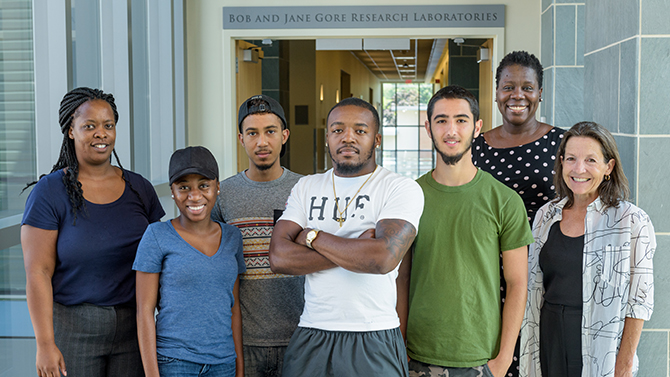


Diversity through partnerships
Photo by Evan Krape September 16, 2016
Diversity is a key goal of Delaware EPSCoR Summer Scholars program
Delaware’s National Science Foundation EPSCoR program is striving to make a difference in undergraduate research and diversity at the University of Delaware.
Over the last few years the program has been developing relationships with several minority-serving institutions in an effort to develop academic pipelines that broaden the participation of underrepresented minorities in research opportunities at UD.
Building on previously established relationships with two historically black colleges and universities (HBCUs), Delaware EPSCoR invited five students from Cheyney University and Florida A&M University (FAMU) to participate in academic research internships this summer at UD.
For several of these students, the internship was their first opportunity to work in an independent research laboratory setting with an academic mentor.
Jarrett Talley from FAMU worked alongside Harsh Bais, associate professor of plant and soil sciences, to study root exudation — chemicals released by plant roots into the soil that may send signals to microbes or other plants. Talley said he was pleased with his experience at UD.
“This experience was not only memorable but also very valuable,” Talley said. “I learned several laboratory techniques and how to present data in poster format, and I have also begun considering graduate school.”
James Madlock from Cheyney said he also gained valuable experience from participating in the program. During the summer Madlock worked with Amy Biddle, assistant professor of animal and food sciences, to study the equine microbiome — the bacterial inhabitants of horses. Specifically, his worked focused on understanding how the equine microbiome interacts with common drugs and nutritional supplements using an in vitro approach.
“In addition to the invaluable learning experience and the opportunity to network with other students and professionals at the career retreat, I was paired with a fabulous mentor who allowed me to be independent but also had the patience to show me lots of useful new things, and that was great,” said Madlock.
In addition to Talley and Madlock, the group included Phania Alcena (FAMU), who worked with Kali Kniel, professor of animal and food sciences, to investigate food safety risks in watermelons grown using poultry manure; Tristum Williams (FAMU), who studied the biogeochemical cycling of phosphorus in soils, sediments and water with Deb Jaisi, assistant professor of plant and soil sciences; and Gregory Patterson (Cheyney), who also worked with Biddle on the equine microbiome.
“We visit each partner institution personally, to talk with students and faculty about research opportunities here,” noted Yolanda Williams-Bey, EPSCoR’s education program manager. “We’re building relationships, and students know that they can call on me if they need something during their stay.”
Throughout the summer, Williams-Bey organizes programs for EPSCoR students, who number about 40 each summer, including a career retreat and communications training. During one event the visiting students had the privilege of meeting with Carol Henderson, vice provost for diversity and professor of English and Black American Studies at UD. Over an informal lunch, the students and Henderson discussed their summer experiences in Delaware and their plans for the future.
“It was a pleasure to meet such outstanding scholars who have much to offer society with their talents and great skills. I look forward to seeing their futures unfold before them,” said Henderson. “EPSCoR joins other great initiatives like the Ronald McNair program in creating innovative scholarly hubs that help to nurture our future scientists, doctors and inventors.”
The opportunity to have students visit from other universities has had a reciprocal impact on the University community. UD’s faculty, staff and students benefit from such exchanges as much as the visiting students.
“We had a great time this summer,” Biddle said. “Greg and James contributed greatly to their respective projects and were wonderful to work with and get to know. They both eagerly dove into our work, from working with anaerobic bacteria to handling horses.”
According to UD senior Dianna Kitt, having the visiting students on campus contributed to one of the best research experiences that she has had at the University.
“It was great to see and learn from all of the other students because I have never been in such a diverse research group before,” she said. “It was really nice to see other diverse and minority students excelling in research, and it was definitely inspiring and beneficial.”
Such visiting scholar programs can also offer longer-term benefits to UD in diversifying the student body.
“Although we started our visiting scholar program just recently, we are pleased to welcome the first participant this fall into graduate study here at UD, and we look forward to many more,” said Jeanette Miller, associate director of the Delaware Environmental Institute and director of Delaware EPSCoR’s education, outreach and diversity thrust.
About EPSCoR
EPSCoR, the Experimental Program to Stimulate Competitive Research, is a federal grant program led by the National Science Foundation (NSF) to help states develop their research capabilities and institutions. It has served as a successful model for similar programs adopted by a number of federal agencies that sponsor scientific research.
The University of Delaware, Delaware State University, Delaware Technical Community College and Wesley College are partners in Delaware’s EPSCoR Research Infrastructure Improvement (RII) grant, the goal of which is to engage science, engineering, social science and policy experts in a vibrant, globally competitive, research and education community to address environmental and energy challenges and capture the economic and societal benefits of the research.
Contact Us
Have a UDaily story idea?
Contact us at ocm@udel.edu
Members of the press
Contact us at 302-831-NEWS or visit the Media Relations website

